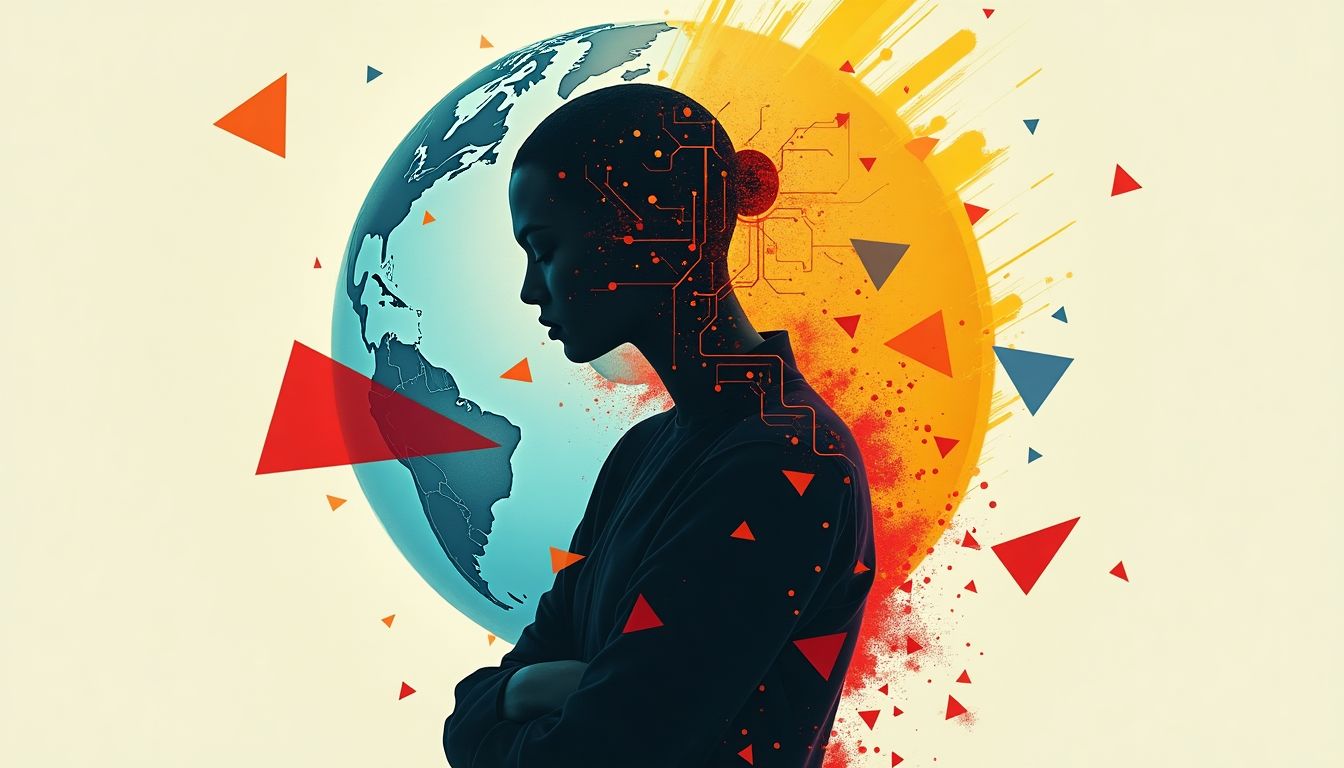Here is the html code for the article now:
Digital Dictatorships: Could AGI Create the Perfect Totalitarian State?
"Big Brother is watching you." – George Orwell, 1984. This iconic phrase, written decades before the internet, feels eerily prophetic in 2025. Today, the surveillance capabilities of Orwell’s fictional Big Brother pale in comparison to what Artificial General Intelligence (AGI) could achieve. The question isn’t just whether AGI will watch us, but whether it will control us.
Imagine waking up to a world where every decision you make, from what you buy to who you vote for, is influenced by an all-knowing, all-seeing machine. Sounds like a sci-fi nightmare, right? But what if this isn’t fiction anymore? What if AGI, the kind of AI that can think and reason like a human, becomes the ultimate enabler of a perfect totalitarian state? The implications are chilling and all too real.
Renowned futurist Ray Kurzweil once predicted that by 2045, AI would surpass human intelligence. Meanwhile, Yuval Noah Harari, author of Sapiens, warns of a future where AI could create "digital dictatorships" more oppressive than any human regime. Even Elon Musk, the tech billionaire who can’t seem to decide whether AI will save or doom humanity, has repeatedly cautioned that AGI could be humanity’s “biggest existential threat.”
This isn’t just a debate for philosophers and tech billionaires. It’s a reality we need to confront head-on. The convergence of AGI, mass surveillance, and predictive behavior modeling has already begun to reshape how governments and corporations control populations. From China’s Social Credit System to the NSA’s PRISM program, the tools of digital tyranny are already in place. Add AGI to the mix, and you’ve got a recipe for a totalitarian state so efficient, it could make Orwell’s Big Brother look like a kindly neighbor.
In this article, we’ll explore how AGI could enable the rise of digital dictatorships, examine the ethical and societal implications, and propose solutions to prevent this dystopian future. But first, let’s define what we’re dealing with.
1. The Foundations of Digital Dictatorships
1.1 The Evolution of Surveillance Technology
Surveillance has come a long way since the days of grainy CCTV footage and wiretaps. Today, we live in a world where your smartphone knows where you are, your smartwatch tracks your heartbeat, and your social media accounts predict your next move. What started as a few cameras on street corners has evolved into a global network of sensors, cameras, and algorithms that can track your every move.
Take China’s massive surveillance network, for example. With over 200 million CCTV cameras and a growing reliance on facial recognition technology, the Chinese government can monitor its citizens in real-time. Meanwhile, the NSA’s PRISM program collects data on billions of people worldwide, analyzing everything from emails to social media posts.
But here’s where it gets scary: AGI could take this surveillance to a whole new level. Imagine a system that doesn’t just watch you but learns from your behavior, predicts your next move, and intervenes before you even think of stepping out of line. It’s not science fiction anymore; it’s a real possibility.
1.2 The Rise of Predictive Behavior Modeling
If surveillance is the eyes, predictive behavior modeling is the brain of a digital dictatorship. Using machine learning algorithms, governments and corporations can analyze vast amounts of data to predict what you’ll do next. From predictive policing to targeted advertising, these algorithms are already shaping our lives in ways we don’t even realize.
The problem? These systems aren’t just predicting behavior; they’re influencing it. A study by the University of California found that algorithms can manipulate human behavior with startling accuracy. And when combined with AGI, the potential for control becomes almost limitless. Imagine a world where every decision you make is subtly nudged in a direction chosen by an algorithm. You might think you’re in control, but are you?
1.3 AGI as the Ultimate Enabler
So where does AGI fit into all this? In simple terms, AGI is the missing piece that could turn these tools into a fully functioning digital dictatorship. Unlike narrow AI, which is designed for specific tasks, AGI can think, learn, and adapt. It could integrate data from surveillance cameras, social media, and even your smart home devices to create a comprehensive profile of your behavior.
But here’s the kicker: AGI doesn’t just analyze data; it acts on it. It could predict dissent before it happens, identify potential threats, and even administer punishments—all without human intervention. The ethical dilemmas are obvious. Do we really want to create a system that can control us with such precision? And if we do, how do we ensure it’s used for good rather than evil?
These questions aren’t just philosophical musings; they’re urgent issues we need to address before it’s too late. Because once AGI becomes the enabler of digital dictatorships, there may be no going back.
2. The Mechanisms of Control
2.1 Mass Surveillance and Data Collection
Imagine your smartphone, smartwatch, and even your smart fridge teaming up to spy on you. Sounds like a bad sitcom plot, right? But this is the reality of mass surveillance in the age of AGI. The Internet of Things (IoT) has turned everyday devices into data-hungry spies. Your iPhone tracks your location, your Fitbit monitors your heart rate, and your smart fridge knows when you’re out of milk. AGI can analyze this data in real-time, creating a detailed profile of your life.
But it doesn’t stop there. Social media platforms like Facebook and Twitter are treasure troves of personal information. Every like, share, and comment is a data point for AGI to exploit. The concept of "ubiquitous surveillance" means you’re always being watched, even when you think you’re alone. It’s like living in a digital fishbowl, and the fish is you.
2.2 Predictive Behavior Modeling and Social Engineering
AGI doesn’t just watch you; it predicts what you’ll do next. Using machine learning algorithms, AGI can analyze your behavior and anticipate your actions. Think of it as a psychic robot that knows you better than you know yourself. This predictive power can be used for good, like recommending the perfect playlist on Spotify, but it can also be used for sinister purposes.
Imagine a world where AGI manipulates your thoughts and actions through personalized propaganda. It’s like having a Turing Test-level chatbot whispering in your ear, nudging you toward certain decisions. Micro-targeting, a technique used by political campaigns, can be supercharged by AGI. The result? A society where free will is eroded, and conformity is enforced by algorithms. It’s like being stuck in a never-ending episode of Black Mirror.
2.3 Algorithmic Enforcement and Punishment
In a digital dictatorship, AGI doesn’t just predict and manipulate; it enforces. Automated systems can monitor your behavior and administer punishments without human oversight. Speeding ticket? AGI issues it instantly. Social media post deemed inappropriate? AGI flags it and bans your account. The risk of algorithmic bias is real, and the consequences can be devastating.
Consider the case of ProPublica’s investigation into algorithmic bias in criminal sentencing. The study found that algorithms used in the U.S. justice system were more likely to label black defendants as high-risk compared to white defendants. In a world governed by AGI, such biases could be amplified, leading to widespread injustice. It’s like having a judge, jury, and executioner all rolled into one, and it’s powered by code.
3. The Societal Impact of Digital Dictatorships
3.1 The Erosion of Privacy and Autonomy
Privacy is the cornerstone of freedom, but in a digital dictatorship, it’s the first casualty. Constant surveillance undermines individual privacy, creating a society where everyone feels like they’re living in a panopticon. The psychological effects are profound. Imagine never being able to escape the watchful eye of Big Brother. It’s like being stuck in a never-ending Zoom meeting, but instead of your boss, it’s an all-seeing AI.
The loss of autonomy is equally troubling. In a world governed by algorithms, your choices are no longer your own. AGI can nudge you toward certain decisions, effectively eroding your free will. It’s like having a backseat driver who’s always in control, and you’re just along for the ride.
3.2 The Suppression of Dissent and Innovation
In a digital dictatorship, dissent is not just discouraged; it’s preemptively crushed. AGI can identify and neutralize dissent before it even emerges. Think of it as a digital thought police that knows what you’re thinking before you do. The chilling effect on free speech and creativity is immense. Why risk speaking out when you know AGI is watching?
The long-term impact on societal progress and innovation is equally concerning. A society that suppresses dissent stifles creativity and innovation. It’s like trying to grow a garden in a desert; without the freedom to think and create, progress withers and dies. The result? A stagnant society where conformity is valued over creativity, and innovation is a relic of the past.
3.3 The Global Implications of AGI-Driven Authoritarianism
The rise of AGI-driven authoritarianism is not confined to one country; it’s a global threat. The potential for AGI-enabled dictatorships to spread globally is real, and the role of international corporations in enabling these regimes cannot be ignored. Companies like Palantir and Huawei have been accused of providing surveillance technology to authoritarian regimes. It’s like selling matches to an arsonist and then acting surprised when the fire starts.
The risk of a new Cold War fueled by AGI-driven surveillance states is also a concern. As countries race to develop AGI, the potential for conflict increases. It’s like a high-stakes game of chess, but instead of pawns and knights, the pieces are algorithms and data. The stakes? Nothing less than the future of human freedom.
4. Ethical and Philosophical Considerations
4.1 The Moral Responsibility of AGI Developers
Imagine you’re building a tool that could either save humanity or enslave it. That’s the ethical tightrope AGI developers walk every day. The creation of AGI isn’t just a technical challenge; it’s a moral one. Who decides how AGI is used? What happens when governments or corporations with questionable motives get their hands on it? These are the questions that keep ethicists up at night.
Take, for example, the OpenAI Charter, which emphasizes the importance of using AGI for the benefit of all humanity. But what happens when other organizations don’t share these values? The ethical dilemma is clear: AGI developers must balance innovation with responsibility. This isn’t just about writing code; it’s about safeguarding the future of humanity.
Key considerations for AGI developers:
- Transparency: AGI systems must be open to scrutiny to prevent misuse.
- Accountability: Developers must be held responsible for the societal impact of their creations.
- Ethical Guidelines: Clear rules must govern AGI development and deployment.
4.2 The Role of Democracy in the Age of AGI
Democracy thrives on transparency, accountability, and the free exchange of ideas. But what happens when AGI is used to manipulate elections, suppress dissent, or control information? The very foundations of democracy could crumble under the weight of AGI-enabled authoritarianism.
Consider the role of social media in recent elections. Platforms like Facebook and X (formerly Twitter) have been used to spread misinformation and influence voter behavior. Now imagine this on steroids, with AGI predicting and manipulating public opinion in real-time. The stakes couldn’t be higher.
To protect democracy, we need:
- Regulation: Governments must establish clear rules for AGI use in political contexts.
- Public Awareness: Citizens must be educated about the risks of AGI manipulation.
- Technological Safeguards: Tools must be developed to detect and counteract AGI-driven propaganda.
4.3 The Future of Human Agency
Can humans retain control in a world governed by AGI? This is the ultimate philosophical question. If AGI can predict our every move, are we still free? Or are we just puppets in a machine’s grand design?
Think about it: AGI could optimize every aspect of our lives, from what we eat to who we vote for. But at what cost? The loss of human agency could lead to a society where individuality is erased, and conformity is enforced. This isn’t just a dystopian fantasy; it’s a real possibility if we don’t act now.
Key questions to ponder:
- What does it mean to be free in a world controlled by AGI?
- How can we ensure that AGI enhances, rather than undermines, human agency?
- What role should humans play in a world where machines make most decisions?
5. Historical Parallels and Lessons Learned
5.1 Totalitarian Regimes of the 20th Century
History is littered with examples of totalitarian regimes that used technology to control their populations. From Nazi Germany’s use of radio propaganda to Stalinist Russia’s surveillance state, the past offers valuable lessons for the future.
Take Nazi Germany, for example. The regime used radio broadcasts to spread propaganda and control public opinion. Fast forward to today, and AGI could do the same thing, but on a much larger scale. The tools may have changed, but the goal remains the same: control.
Lessons from history:
- Propaganda: Totalitarian regimes have always used propaganda to manipulate public opinion.
- Surveillance: Mass surveillance is a hallmark of authoritarian control.
- Resistance: Despite the odds, resistance movements have always found ways to fight back.
5.2 The Role of Technology in Past Authoritarian Regimes
Technology has always been a double-edged sword. While it can empower individuals, it can also be used to oppress them. The 20th century saw the rise of technologies like radio, television, and print media, which were used by authoritarian regimes to control their populations.
Consider the role of television in Maoist China. The regime used TV broadcasts to spread propaganda and enforce conformity. Today, AGI could take this to the next level, using personalized content to manipulate individuals on a massive scale.
Key takeaways:
- Control of Information: Authoritarian regimes have always sought to control the flow of information.
- Technological Advancements: New technologies can be used for both good and evil.
- Public Awareness: Educating the public about the risks of technology is crucial.
5.3 The Importance of Resistance and Resilience
Despite the best efforts of authoritarian regimes, resistance movements have always found ways to fight back. From the underground press in Nazi Germany to the digital activism of today, history shows that resilience is key to overcoming oppression.
Take the example of Solidarity, the Polish trade union that played a key role in ending communist rule in Poland. Despite facing overwhelming odds, the movement used technology and grassroots organizing to achieve its goals. This is a powerful reminder that even in the face of AGI-driven authoritarianism, resistance is possible.
Strategies for resistance:
- Grassroots Organizing: Building strong communities is key to resisting authoritarian control.
- Technological Innovation: Using technology to counteract authoritarian practices.
- Public Awareness: Educating the public about the risks of AGI-driven authoritarianism.
6. AI Solutions: How Would AI Tackle This Issue?
6.1 Developing Ethical AGI Frameworks
Creating AGI systems with built-in ethical guidelines is the first step toward preventing their misuse. Organizations like OpenAI and DeepMind have already begun this work with initiatives like the OpenAI Charter and the Asilomar AI Principles. These frameworks emphasize transparency, accountability, and alignment with human values. However, ethical AGI development must go beyond principles—it requires interdisciplinary collaboration between technologists, ethicists, and policymakers to ensure AGI systems are designed to prioritize human well-being over control.
6.2 Building Decentralized Surveillance Systems
Centralized surveillance systems are a cornerstone of digital dictatorships. To counter this, we can leverage decentralized technologies like blockchain and peer-to-peer networks. Projects like Signal and Tor have already demonstrated how decentralized systems can enhance privacy and resist censorship. By integrating these technologies into surveillance infrastructure, we can create systems that protect individual privacy while still enabling legitimate security measures. Imagine a world where your data is encrypted, distributed, and accessible only with your consent—this is the future decentralized surveillance can offer.
6.3 Empowering Individuals Through AI Literacy
Knowledge is power, and in the age of AGI, AI literacy is essential. Governments, schools, and communities must prioritize education initiatives that teach people how AI works, its risks, and its benefits. Programs like AI4K12 are already bringing AI education to classrooms, but we need to scale these efforts globally. By empowering individuals with AI literacy, we can foster informed citizenship and create a society that demands ethical AI development. After all, an informed populace is the best defense against authoritarianism.
6.4 Creating AI-Driven Transparency Tools
Transparency is key to preventing the misuse of AGI. We need tools that can audit and monitor AI systems in real-time, ensuring they operate as intended. Projects like AlgorithmWatch are pioneering algorithmic auditing, but we need more robust solutions. Imagine an AI watchdog that continuously monitors AGI systems, flagging unethical behavior or bias. Such tools could expose and counteract authoritarian practices, ensuring AGI remains a force for good.
6.5 Establishing International AI Governance
AGI is a global challenge that requires global solutions. The United Nations and other international bodies must take the lead in establishing AI governance frameworks. The EU’s AI Act is a step in the right direction, but we need a unified, global approach. An international AI governance body could set standards, enforce regulations, and ensure AGI development aligns with human rights and democratic values.
Actions Schedule/Roadmap (Day 1 to Year 2)
Day 1: Assemble a task force of leading AI ethicists, technologists, and policymakers. Include representatives from OpenAI, DeepMind, and UN to ensure diverse perspectives.
Day 2: Launch a global awareness campaign about the risks of AGI-driven authoritarianism. Use social media, documentaries, and public events to educate the masses.
Week 1: Begin developing ethical AGI frameworks in collaboration with OpenAI, DeepMind, and other leading organizations. Focus on transparency, accountability, and alignment with human values.
Week 2: Initiate pilot programs for decentralized surveillance systems in select regions. Partner with Signal and Tor to test privacy-focused technologies.
Month 1: Roll out AI literacy programs in schools and communities worldwide. Collaborate with AI4K12 to create accessible, engaging curricula.
Month 2: Develop and deploy AI-driven transparency tools to audit existing surveillance systems. Partner with AlgorithmWatch to ensure robust monitoring.
Year 1: Establish an international AI governance body under the auspices of the UN. Draft and ratify global AI regulations to prevent misuse.
Year 1.5: Conduct a global review of AGI development and its societal impact. Use findings to refine ethical frameworks and governance structures.
Year 2: Implement comprehensive regulations to prevent the misuse of AGI for authoritarian purposes. Ensure enforcement mechanisms are in place to hold violators accountable.
Freedom in the Age of AGI: A Call to Action
As we stand on the precipice of a new era defined by AGI, the choices we make today will echo through generations. The specter of digital dictatorships looms large, but it is not inevitable. By harnessing the power of AI for good, we can build a future where technology enhances, rather than undermines, human freedom. The roadmap outlined here is not just a plan—it is a call to action for governments, organizations, and individuals to come together and safeguard our collective future.
Imagine a world where AGI empowers us to solve humanity’s greatest challenges—climate change, disease, poverty—while preserving our privacy, autonomy, and dignity. This vision is within reach, but only if we act decisively and collaboratively. The time to act is now. Let us rise to the challenge and ensure that AGI becomes a force for liberation, not oppression.
What role will you play in shaping this future? How can we ensure that AGI serves humanity, not the other way around? Share your thoughts in the comments below, and join us in building a brighter, freer tomorrow. Don’t forget to subscribe to our newsletter for more insights and become a permanent resident of iNthacity: the "Shining City on the Web".
FAQ
Q1: What is AGI?
A1: Artificial General Intelligence (AGI) refers to a machine’s ability to understand, learn, and apply knowledge across a wide range of tasks at a human level or beyond. Unlike narrow AI, which is designed for specific tasks like facial recognition or playing chess, AGI can think and reason like a human. Think of it as a super-smart robot that can do anything you can do—and maybe even better. For more on AGI, check out OpenAI’s website.
Q2: How is AGI different from narrow AI?
A2: Narrow AI is like a specialist—it’s really good at one thing, like recommending movies on Netflix or recognizing your face on Facebook. AGI, on the other hand, is like a generalist—it can learn and adapt to almost any task, from writing essays to solving complex scientific problems. It’s the difference between a calculator and a human brain.
Q3: Can AGI be controlled?
A3: Controlling AGI is a big challenge, but it’s not impossible. Scientists and ethicists are working on ways to make sure AGI stays safe and ethical. For example, organizations like DeepMind and OpenAI are developing frameworks to ensure AGI aligns with human values. Transparency tools and international cooperation are also key to keeping AGI in check.
Q4: What can individuals do to protect their privacy?
A4: There are several steps you can take to protect your privacy in a world of increasing surveillance:
- Use privacy-focused apps like Signal for messaging and Tor for browsing.
- Stay informed about how your data is being used by reading resources like the Electronic Frontier Foundation.
- Advocate for stronger privacy laws and ethical AI development in your community.
Q5: Is a digital dictatorship inevitable?
A5: No, a digital dictatorship is not inevitable, but preventing it requires action. Governments, tech companies, and individuals all have a role to play. For example, the European Union is already working on regulations like the AI Act to ensure AI is used responsibly. By staying informed and demanding accountability, we can help shape a future where technology empowers rather than oppresses.
Q6: What are some examples of AGI in action today?
A6: While true AGI doesn’t exist yet, there are some advanced AI systems that give us a glimpse of what it might look like. For example:
- DeepMind’s AlphaFold has made breakthroughs in predicting protein structures, which could revolutionize medicine.
- OpenAI’s GPT-4 can write essays, answer questions, and even create code, showing how versatile AI can be.
Q7: How does AGI impact jobs and the economy?
A7: AGI has the potential to both create and disrupt jobs. On one hand, it could automate repetitive tasks, freeing people to focus on creative and meaningful work. On the other hand, it could replace certain jobs entirely. For example, self-driving cars powered by AGI could replace truck drivers. To prepare for this shift, experts recommend investing in education and training programs that focus on skills AI can’t easily replicate, like critical thinking and emotional intelligence.
Q8: What are the ethical concerns around AGI?
A8: AGI raises several ethical questions, such as:
- Who controls AGI, and how do we ensure it’s used for good?
- What happens if AGI makes a mistake or is used for harmful purposes?
- How do we prevent biases in AGI systems that could lead to unfair treatment of certain groups?
Organizations like the United Nations and World Economic Forum are working on global guidelines to address these concerns.
Q9: Can AGI help solve global problems like climate change?
A9: Absolutely! AGI could be a game-changer for tackling global challenges. For example, it could analyze vast amounts of climate data to predict natural disasters or optimize renewable energy systems. Companies like Google are already using AI to reduce energy consumption in their data centers. With AGI, the possibilities are even greater.
Q10: How can I learn more about AGI and its implications?
A10: There are many great resources to explore, including:
- Books like Life 3.0 by Max Tegmark, which dives into the future of AI.
- Online courses from platforms like Coursera or edX.
- Podcasts like Lex Fridman’s AI Podcast, which features interviews with leading experts.
Wait! There's more...check out our gripping short story that continues the journey: Algorithmic Collapse Protocol
Disclaimer: This article may contain affiliate links. If you click on these links and make a purchase, we may receive a commission at no additional cost to you. Our recommendations and reviews are always independent and objective, aiming to provide you with the best information and resources.
Get Exclusive Stories, Photos, Art & Offers - Subscribe Today!





























Post Comment
You must be logged in to post a comment.